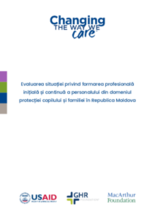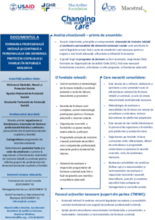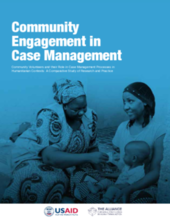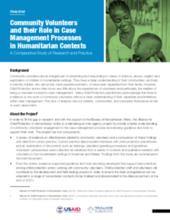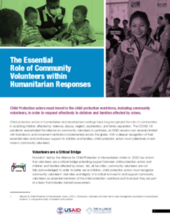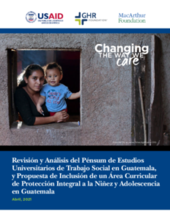Displaying 91 - 100 of 505
Scopul evaluării sistemului de formare profesională inițială și continuă a personalului din
domeniul protecției copilului și familiei din Republica Moldova este de a contribui la
consolidarea acestuia în baza celor recente dezvoltări programatice, legislative și
metodologice la nivel național și internațional, cât și să contribuie efectiv la sporirea
calității prestării serviciilor pentru copiii și familiile vulnerabile prin creșetrea
competențelor profesioniștilor din sistem.
Cercetarea a implicat efectuarea unei evaluări a formărilor, competențelor, punctelor forte și lacunelor forței de muncă din serviciile sociale.
Community volunteers are an integral part of preventing and responding to cases of violence, abuse, neglect and exploitation of children in humanitarian settings. They have a deep understanding of their communities, and help to identify children who are at-risk, have experienced harm, or have been separated from their family. Following global and field research conducted in 2020, the Alliance has produced key resources related to the roles of community volunteers in Child Protection case management in humanitarian settings.
The Alliance for Child Protection in Humanitarian Action undertook an inter-agency project to provide a better understanding of community volunteers’ engagement in the case management process and develop guidance and tools to support their work.
This is a 3-page document targeting donors, policy makers, and UN agencies regarding the roles of volunteers and how decision makers can support their roles
This paper fills a gap in specialized knowledge regarding continuing professional development (CPD) in social work in Romania by examining how child protection Romanian social workers experience CPD throughout their professional lives.
In April 2021, the Child Welfare League of Canada (CWLC), in partnership with the Children’s Aid Foundation of Canada, led a series of cross-sectoral convenings with the goal of introducing a positive obligation for government and service providers to assist families who are experiencing difficulties in a context of poverty. This three-day event convened people across sectors to gain a better understanding of how the child welfare system responds to the conditions that place families at an increased risk of child protection involvement due to assessments of ‘neglect’. The goal of Beyond Neglect is to develop and champion evidence-based legislative frameworks that could help service providers and governments to better meet the needs of children, youth and their families.
Most children involved with the child welfare system are not separated from their families but instead receive services while living at home. This issue brief explores effective in-home services that are being used to promote safety and help keep children and families together, as well as practical considerations for their implementation. It then presents promising practices used by States and jurisdictions that are working to improve their delivery of in-home services.
Esta evaluación curricular esta dirigida a profesionales, personal y estudiantes de programas de trabajo social; la cual se basó en el análisis de cinco planes de estudio universitarios guatemaltecos relacionados con el trabajo social, utilizando un marco de competencias que incluyó habilidades y conocimientos básicos sobre los derechos de la niñez y adolescencia, la protección y el bienestar. Los resultados destacaron que los planes de estudio eran valiosos en muchos sentidos, sin embargo, presentan oportunidades para fortalecer los contenidos a fin de preparar con mayor profundidad al recurso humano convirtiendose en defensores de los derechos y la protección de los niños, niñas o adolescentes
ស្របពេលដែលកើតមានឡើងនូវការរីករាលដាលនៃជំងឺកូវីដ-១៩ក្នុងសហគមន៍នៅទូទាំងប្រទេសកម្ពុជា យើងសូមចែករំលែកនូវវីដេអូមួយ ស្តីពីការគាំទ្រដល់បុគ្គលិកកាន់ករណី ក្នុងការធានាថា កុមារ និងគ្រួសារពួកគេ ដែលកំពុងទទួលការគាំទ្រពីយើង រួមទាំងខ្លួនបុគ្គលិកផ្ទាល់មានសុវត្ថិភាព។ យើងសង្ឃឹមថាវីដេអូខ្លីនេះ នឹងផ្តល់ជាសារប្រយោជន៍ដល់អ្នក និងក្រុមការងារ។ សូមថ្លែងអំណរគុណដល់ក្រសួងសង្គមកិច្ច អតីតយុទ្ធជន និងយុវនីតិសម្បទា សម្រាប់ការដឹកនាំការផលិត ដើម្បីឱ្យវីដេអូនេះសមស្របជាមួយគោលការណ៍ណែនាំ ស្តីពីការគ្រប់គ្រងករណីក្នុងអំឡុងពេលជំងឺកូវីដ១៩។ សូមរក្សាសុវត្ថិភាពរបស់ខ្លួនឱ្យបានខ្ជាប់ខ្ជួនគ្រប់ពេលវេលា។

